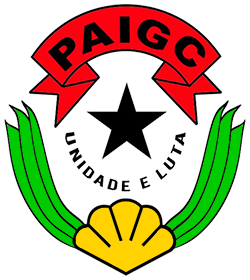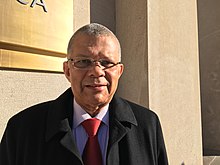Contents
Early life and education
Veiga was born in 1949 in Mindelo, São Vicente to Alfredo José de Carvalho Veiga and Maria Augusta Wahnon. He later attended school in Praia on the island of Santiago, and later, he graduated in 1971 from the University of Lisbon with a degree in law. [1] Veiga's Jewish maternal grandfather immigrated to Cape Verde from Gibraltar in the 1840s. He is Cape Verde's first ambassador to Israel of Jewish descent. [2]
Career
After briefly living in Angola from 1972 to 1974, Veiga returned to Cape Verde in 1975, the year that it became independent, to join the African Party for the Independence of Guinea and Cape Verde (PAIGC). During his time in the PAIGC, Veiga served the Ministry of Public Administration from 1975 to 1980 as a judge. After leaving the African Party for the Independence of Cape Verde, he resumed his legal career and led the bar of Cape Verde from 1982 to 1986. [1]
Politics
In 1985, Veiga was elected to the National Assembly as an independent candidate. Later, in 1989, Veiga was selected to become the president for the Movement for Democracy Party. After the 1991 elections, the Prime Minister of Cape Verde, Pedro Pires stepped down and Veiga took his place. [1]
Veiga served as prime minister under President António Mascarenhas Monteiro, and resigned in July 2000 in order to stand as the MpD's candidate in the 2001 presidential election. [3] He was succeeded as prime minister by Gualberto do Rosário. [4]
In the 2001 presidential election, Veiga lost by 17 votes to Pedro Pires of the African Party for the Independence of Cape Verde (PAICV) in the second round of voting. [5] He ran again for president in the 2006 presidential election, but he was defeated again by Pires. [6] He ran for president a third time in the 2021 presidential election, and lost to José Maria Neves in the first round. [7]
Related Research Articles

Politics of Cape Verde takes place in a framework of a semi-presidential representative democratic republic, whereby the Prime Minister of Cape Verde is the head of government and the President of the Republic of Cape Verde is the head of state, and of a multi-party system. Executive power is exercised by the president and the government. Legislative power is vested in both the government and the National Assembly. The judiciary is independent of the executive and the legislature. The constitution, first approved in 1980 and substantially revised in 1992, forms the basis of government organization. It declares that the government is the "organ that defines, leads, and executes the general internal and external policy of the country" and is responsible to the National Assembly.

The recorded history of Cape Verde begins with the Portuguese invasion and colonization of the island in 1458. Possible early references to Cape Verde date back at least 2,000 years.

Aristides Maria Pereira was a Cape Verdean politician. He was the first President of Cape Verde, serving from 1975 to 1991.

Pedro de Verona Rodrigues Pires is a Cape Verdean politician who served as Prime Minister of Cape Verde from 1975 to 1991, and later as President from 2001 to 2011.

José Maria Pereira Neves is a Cape Verdean politician who is currently the president of Cape Verde, having previously served as the Prime Minister of Cape Verde from 2001 to 2016. He is a member of the African Party for the Independence of Cape Verde (PAICV). In the 2021 presidential election, he was elected with 51.7% of votes, beating his nearest rival Carlos Veiga who got 42.4% of the total votes.

The African Party for the Independence of Guinea and Cape Verde is a political party in Guinea-Bissau. Originally formed to peacefully campaign for independence from Portugal, the party turned to armed conflict in the 1960s and was one of the belligerents in the Guinea-Bissau War of Independence. Towards the end of the war, the party established a socialist one-party state, which remained intact until multi-party democracy was introduced in the early 1990s. Although the party won the first multi-party elections in 1994, it was removed from power in the 1999–2000 elections. However, it returned to office after winning parliamentary elections in 2004 and presidential elections in 2005, since which it has remained the largest party in the National People's Assembly.

The Movement for Democracy is a Christian democratic and liberal party in Cape Verde. Established in 1990, it was the ruling party from 1991 to 2001 and returned to power in the 2016 parliamentary election. Its members are nicknamed "os ventoinhas" in Portuguese, a reference to the party's logo.

The African Party of Independence of Cape Verde is a democratic socialist political party in Cape Verde. It was formerly a Marxist–Leninist communist party and the sole legal party in the country from 1981 to 1990. Its members are nicknamed "os tambarinas" in Portuguese, and they identify themselves with the color yellow.

The National Assembly is the unicameral legislative body of the Republic of Cabo Verde.

Presidential elections were held in Cape Verde on 12 February 2006, the fourth presidential elections since the introduction of multi-party politics in 1990.

Cape Verde or Cabo Verde, officially the Republic of Cabo Verde, is an archipelago and island country of West Africa in the central Atlantic Ocean, consisting of ten volcanic islands with a combined land area of about 4,033 square kilometres (1,557 sq mi). These islands lie between 600 and 850 kilometres west of Cap-Vert, the westernmost point of continental Africa. The Cape Verde islands form part of the Macaronesia ecoregion, along with the Azores, the Canary Islands, Madeira and the Savage Isles.

Presidential elections were held in Guinea-Bissau on 28 June 2009 following the assassination of President João Bernardo Vieira on 2 March 2009. As no candidate won a majority in the first round, a second round was held on 26 July 2009 between the two leading candidates, Malam Bacai Sanhá of the governing African Party for the Independence of Guinea and Cape Verde (PAIGC) and opposition leader Kumba Ialá. Sanhá won with a substantial majority in the second round, according to official results.

Presidential elections were held in Cape Verde on 11 February 2001, with a second round on 25 February after no candidate achieved outright victory in the first round. The result was a victory for Pedro Pires of the African Party for the Independence of Cape Verde, who defeated Carlos Veiga of the Movement for Democracy by just twelve votes. Pires, a former Prime Minister, took office on 22 March 2001, replacing António Mascarenhas Monteiro, who stood down after completing two terms in office.
Events in the year 2011 in Cape Verde.

Cape Verde–Guinea Bissau relations refers to the bilateral relationship between the Republic of Cape Verde and the Republic of Guinea-Bissau. Cape Verde is an island country about 900 km north-west of Guinea-Bissau, a coastal West African country. Both were colonies of the Portuguese Empire and they campaigned together for independence with a plan for unification, but the countries separated after 1980. The two countries were both founder members of the Community of Portuguese Language Countries (CPLP) in 1996, and are each members of the African Union and the Economic Community of West African States (ECOWAS).
The following lists events that happened during 2001 in Cape Verde.

Liceu Domingos Ramos is a public secondary school in the northern part of the city centre (Plateau) of Praia, Cape Verde. As of 2015, it has 2,300 students, 63 classes and 110 teachers. It was established as Liceu Adriano Moreira in 1960. In 1975, at the independence of Cape Verde, it was renamed Liceu Domingos Ramos.

Presidential elections were held in Cape Verde on 17 October 2021. The result was a victory for José Maria Neves of the opposition African Party for the Independence of Cape Verde (PAICV), who received 51.8% of the vote.
References
- 1 2 3 Rake, Alan (2001). African Leaders: Guiding the New Millennium. pp. 41–44. ISBN 0810840197 . Retrieved 26 November 2016.
- ↑ Skirble, Rosanne (October 29, 2018). "Rediscovering and Restoring Cape Verde's Jewish Heritage". Moment . Retrieved March 8, 2021.
- ↑ Szajkowski, Bogdan, ed. (2005). Political Parties of the World (6th ed.). pp. 113–114. ISBN 0954381149.
- ↑ A Political Chronology of Africa (1st ed.). Europa Publications. 2 September 2003. p. 67. ISBN 0203409957 . Retrieved 26 November 2016.
- ↑ "New president for Cape Verde", BBC News, March 6, 2001.
- ↑ Akyeampong, Emmanuel Kwaku; Louis Gates, Henry (2012). Dictionary of African Biography, Volume 6. p. 120. ISBN 9780195382075 . Retrieved 26 November 2016.
- ↑ "Opposition candidate Neves wins Cape Verde election". Reuters. 18 October 2021.
External links
Carlos Veiga | |
|---|---|
 | |
| Prime Minister of Cape Verde | |
| In office 4 April 1991 –29 July 2000 |
